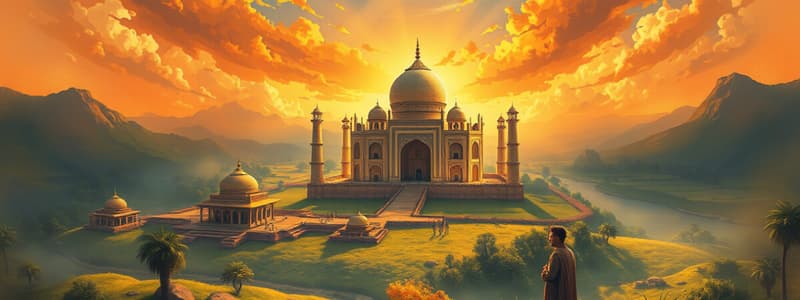Podcast
Questions and Answers
Who was the first woman to win a Nobel Prize?
Who was the first woman to win a Nobel Prize?
- Marie Curie (correct)
- Mother Teresa
- Rosalind Franklin
- Ada Lovelace
Which is the hardest known natural material?
Which is the hardest known natural material?
- Gold
- Iron
- Diamond (correct)
- Platinum
Which planet is known as the Morning Star?
Which planet is known as the Morning Star?
- Jupiter
- Venus (correct)
- Mars
- Mercury
What is the capital of Egypt?
What is the capital of Egypt?
Who painted the Mona Lisa?
Who painted the Mona Lisa?
Which country is known as the Land of the Midnight Sun?
Which country is known as the Land of the Midnight Sun?
Who invented the light bulb?
Who invented the light bulb?
What is the chemical symbol for gold?
What is the chemical symbol for gold?
Who was the first President of India?
Who was the first President of India?
Which planet is referred to as the Red Planet?
Which planet is referred to as the Red Planet?
What is the capital city of Australia?
What is the capital city of Australia?
Who composed the national anthem of India?
Who composed the national anthem of India?
Which continent is the largest in the world?
Which continent is the largest in the world?
What is the chemical symbol commonly used for water?
What is the chemical symbol commonly used for water?
Which ocean is the smallest in the world?
Which ocean is the smallest in the world?
Who is recognized as the Father of the Indian Constitution?
Who is recognized as the Father of the Indian Constitution?
Flashcards are hidden until you start studying
Study Notes
Notable Figures in Science and Literature
- Marie Curie: First woman to win a Nobel Prize, recognized for her pioneering research on radioactivity.
- Alexander Fleming: Discovered penicillin, a revolutionary antibiotic that transformed medicine.
- Louis Pasteur: Renowned for his contributions to microbiology and the development of vaccines.
- Gregor Mendel: Known as the father of genetics for his foundational work on heredity.
Geography and Nations
- Sahara Desert: Largest desert in the world, covering parts of North Africa.
- Japan: National sport is Sumo Wrestling, a traditional sport with deep cultural significance.
- Italy: Capital is Rome, known for its rich history and art.
- Egypt: Capital is Cairo, famous for its ancient civilization and monuments.
- Australia: Capital is Canberra, a planned city chosen as the national capital.
Mammals and Wildlife
- Blue Whale: Largest mammal in the world, reaching lengths of up to 100 feet.
- African Elephant: The largest terrestrial animal, known for its intelligence and social behavior.
Chemical Elements and Symbols
- Gold: Chemical symbol is Au, highly valued for its rarity and use in jewelry.
- Water: Chemical symbol is H2O, essential for all known forms of life.
- Oxygen: Chemical symbol is O, vital for respiration in living organisms.
Historical Milestones
- Jawaharlal Nehru: First Prime Minister of India, a key figure in India's independence movement.
- Dr. Rajendra Prasad: First President of India, instrumental in shaping the new nation post-independence.
- Sardar Vallabhbhai Patel: Known as the Iron Man of India for his role in uniting the country.
Literature and Art
- J.K. Rowling: Author of the 'Harry Potter' series, which has gained immense popularity worldwide.
- Leonardo da Vinci: Painted the Mona Lisa, one of the most renowned works of art.
- William Shakespeare: Famous playwright known for works like 'Romeo and Juliet'.
Planetary Facts
- Venus: Known as the Morning Star and Earth's twin due to its similar size and proximity.
- Mars: Recognized as the Red Planet, often the subject of exploration missions.
Miscellaneous Trivia
- Skin: Largest organ in the human body, serving as a protective barrier.
- Diamond: Hardest known natural material, valued for its clarity and brilliance.
- Arctic Ocean: Smallest ocean in the world, located around the Arctic region.
- Vatican City: Smallest country in the world by both area and population, an independent city-state.
Famous Discoveries
- Telephone: Invented by Alexander Graham Bell, revolutionizing communication.
- Nile River: Longest river in the world, flowing through northeastern Africa.
Cultural Aspects
- Rabindranath Tagore: Wrote the national anthem of India, symbolizing the country's spirit.
- Japan: Known as the Land of the Rising Sun, reflecting its eastern position relative to the continent.
Studying That Suits You
Use AI to generate personalized quizzes and flashcards to suit your learning preferences.




